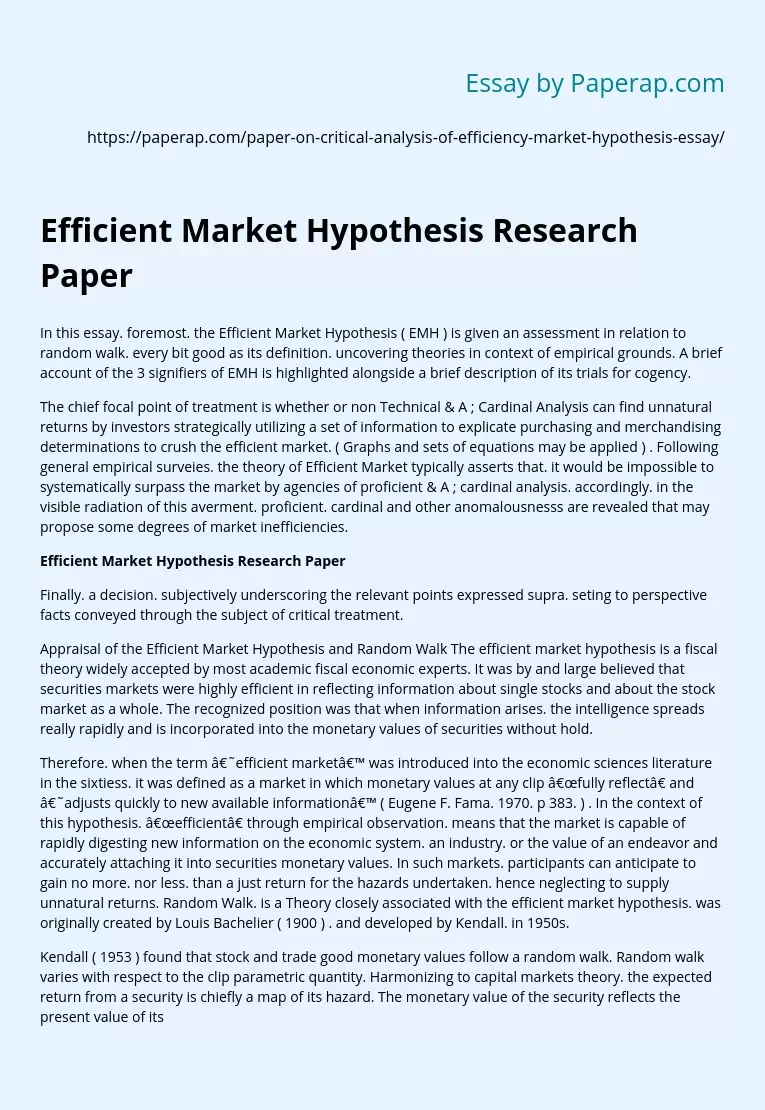Efficient Market Hypothesis Research Paper
In this essay foremost the Efficient Market Hypothesis ( EMH ) is given an assessment in relation to a random walk. every bit good as its definition. uncovering theories in the context of empirical grounds. A brief account of the 3 signifiers of EMH is highlighted alongside a brief description of its trials for cogency.
The chief focal point of treatment is whether or non-Technical & A; Cardinal Analysis can find unnatural returns by investors strategically utilizing a set of information to explicate purchasing and merchandising determinations to crush the efficient market.
Following general empirical surveys. the theory of Efficient Market typically asserts that. it would be impossible to systematically surpass the market by agencies of proficient & A ; cardinal analysis. accordingly. in the visible radiation of this averment. proficient. cardinal and other anomalousness are revealed that may propose some degrees of market inefficiencies.
Efficient Market Hypothesis Research Paper
Finally a decision. subjectively underscoring the relevant points expressed supra. setting to perspective facts conveyed through the subject of critical treatment.
Appraisal of the Efficient Market Hypothesis and Random Walk The efficient market hypothesis is a fiscal theory widely accepted by most academic fiscal economic experts. It was, by and large, believed that securities markets were highly efficient in reflecting information about single stocks and about the stock market as a whole. The recognized position was that when information arises. the intelligence spreads really rapidly and is incorporated into the monetary values of securities without hold.
Therefore. when the term ‘efficient market’ was introduced into the economic sciences literature in the sixties.
it was defined as a market in which monetary values at any clip “fully reflect” and ‘adjust quickly to the newly available information. In the context of this hypothesis. “efficient” through empirical observation. means that the market is capable of rapidly digesting new information on the economic system. an industry. or the value of an endeavor and accurately attaching it into securities monetary values. In such markets. participants can anticipate gaining no more. nor less. then a just return for the hazards undertaken. hence neglecting to supply unnatural returns. Random Walk. is a Theory closely associated with the efficient market hypothesis. was originally created by Louis Bachelier . and developed by Kendall. in the 1950s.
Kendall ( 1953 ) found that stock and trade good monetary values follow a random walk. Random walk varies with respect to the clip parametric quantity. Harmonizing to capital markets theory. the expected return from security is chiefly a map of its hazard. The monetary value of the security reflects the present value of its expected future hard currency flows. which incorporates many factors such as volatility. liquidness. and hazard of bankruptcy. However. while monetary values are rationally based. alterations in monetary values are expected to be random and unpredictable. because of new information. by its real nature. is unpredictable. Therefore stock monetary values are said to follow a Random Walk.
Versions of the Efficiency Market Hypothesis and trials Following the construct of information. as stated in the above paragraph. it is utile to separate among three versions of the EMH. Fama ( 1970 ) identified as the weak. semi-strong. and strong signifiers of the hypothesis. These versions differ by their impressions of what is meant by the term “all available information. ” The trials for each signifier. summarized in brief. through empirical observation shows grounds in favor of EMH: Harmonizing to Fama ( 1970 ). Weak signifier efficiency claims that all past monetary values of a stock are reflected in today’s stock monetary value. Therefore. proficient analysis can non be used to foretell and crush a market.
The Weak Form Tests. The trial of the weak signifier of the EMH is by and large taken to consist of; an autocorrelation trial. a runs trial and filter regulation trial. An autocorrelation trial investigates whether security returns are related through the clip. On the other. a runs trial. for illustration. measures the likeliness that a series of two variables is a random happening. A filter regulation ( or merchandising trial ) is a trading regulation sing the actions to be taken when portions rise or fall in value by x %. Filter regulations should non work if markets are weak-form efficient.
Overall. the trials highlighted. statistically tests for independence. to set up the weak-form holds. thereby annulling strategic regulations for proficient analysis. to obtain unnatural net incomes. Following the weak-form, EMH. is the Semi-Strong signifier efficiency in which Fama ( 1970 ) states that security monetary values reflect all publically available information.
The Semi-Strong Test. Trials for the semi-strong. significantly and reveals Event Study. The first event survey was undertaken by Fama. Fisher. Jensen and Roll. though the first to be published was by Ball and Brown ( 1968 ). An event trial analyzes the security both before and after an event. such as net incomes proclamations. stock splits and analyst’s recommendations. The thought behind the event trial is that an investor will non be able to harvest an above-norm return by trading. on an event including the Cardinal Analysis scheme.
Efficient Market Hypothesis Research Paper. (2019, Dec 05). Retrieved from https://paperap.com/paper-on-critical-analysis-of-efficiency-market-hypothesis-essay/

